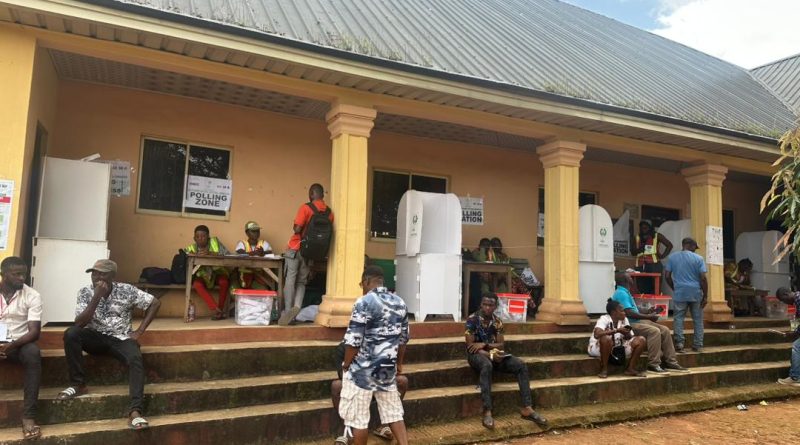How low turnout, vote buying in Anambra election exposed governance gaps – CDD
Low voter participation and widespread vote buying in the 2025 Anambra governorship election reflect deeper governance challenges in Nigeria, the Centre for Democracy and Development (CDD-West Africa) has said.
In a statement shared with PREMIUM TIMES on Sunday, the organisation said its Election Analysis Centre (CDD-EAC) observed notable progress by the Independent National Electoral Commission (INEC), but said challenges in the electoral process persisted.
“With INEC’s claim of 98.8 per cent PVC collection, a 99.62 per cent result upload on the IReV platform, and a generally peaceful election environment, INEC made significant progress.
“These successes are commendable. However, 5.4 per cent of polling units experienced notable delays, with officials arriving late,” said Dauda Garuba, the director of CDD-West Africa, and Victor Adetula, the chairperson of CDD-EAC, in a joint statement.
Low voters
A PREMIUM TIMES analysis explained that over 2.8 million voters were registered for Saturday’s off-cycle governorship election, up from 2.65 million in 2023.
The updated register followed a Continuous Voter Registration exercise and a biometric clean-up that removed 27,817 multiple entries. This added 140,370 new valid voters and 5,983 transfer approvals to the voter roll.
Despite the increase, voter turnout remained low. Only 598,229 of the 2,788,864 registered voters were accredited, representing a 21.4 per cent participation rate.
Also, 584,054 valid votes were recorded, with 11,244 rejected.
Soludo’s victory
INEC on Sunday declared incumbent Governor Charles Soludo of the All Progressives Grand Alliance (APGA) the winner of the election.
He polled 422,664 votes to defeat Nicholas Ukachukwu of the All Progressives Congress (APC), who scored 99,445 votes.
Labour Party candidate George Moghalu came third with 10,576 votes, while John Chuma-Nwosu of the African Democratic Congress (ADC) had 8,208 votes.
Governor Soludo’s victory spanned all 21 local government areas of Anambra, making him only the second individual to achieve such a feat in the state’s history, after former Governor Willie Obiano in 2017.
But the CDD criticised political parties for limited voter mobilisation, describing campaigns as “marked by low visibility and an absence of issue-based engagement,” which contributed to limited competitiveness.
The organisation also raised concerns about election security. Over 45,000 security personnel were deployed across the state and present at 87.3 per cent of observed polling units, while 12.7 per cent of units had no security presence.
While this helped maintain a largely peaceful election, CDD warned that the arrangement may not be sustainable once personnel withdraw.
Vote buying was widespread, the group said, with cash and digital transfers ranging from N2,000 to N10,000 offered to influence voters.
“Vote buying remains the most predictable strategy in the absence of issue-based campaigning and delivery of good governance,” the statement added.
It stated that young voters, women, and persons with disabilities were disproportionately absent from the polls, facing barriers such as inaccessible polling booths and a lack of voting aids.
CDD tracked over 200 claims of election-related disinformation. Of 45 fact-checkable claims, 54 per cent were false, 27 per cent true, and 10 per cent misleading.
It noted that targets included political parties, INEC, and security agencies, with actors using hate speech, insecurity narratives, and artificial intelligence to distort information.
“Despite high registration numbers, turnout was only 21.4 per cent, up from 10.2 per cent in 2021, still reflecting troubling disengagement from the democratic process,” the CDD statement said.
The organisation recommended reforms to strengthen electoral integrity, including improving INEC’s operational capacity, decentralised planning, timely funding, and consistent communication.
It also urged political parties to prioritise voter education, conduct issue-based campaigns, uphold internal democracy, and adhere to transparent campaign financing.
READ ALSO: Soldiers shoot police officers returning from Anambra election
CDD stressed the need for a sustainable security architecture, deliberate efforts to discourage vote trading, and robust civic education.
It also called on stakeholders, including media, security agencies, and civil society organisations, to collaborate in identifying and debunking disinformation.
“As the country prepares for the 2026 off-cycle elections and the 2027 general elections, these reforms must be prioritised. Nigeria’s democratic survival depends not just on voting but on the strength of institutions and governance practices that surround it,” the statement added.


